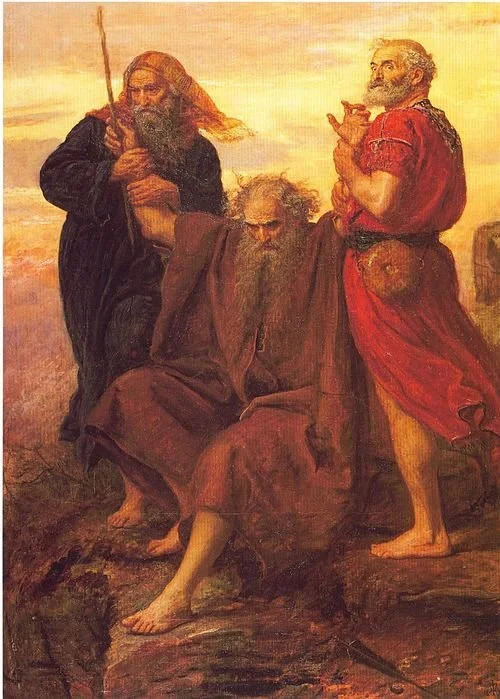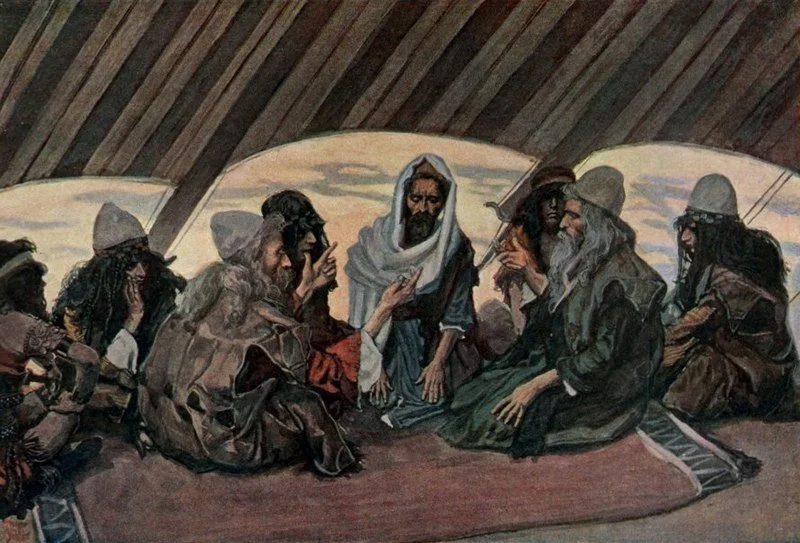Bible Study Notes - Exodus Chapters 15-18: Trusting God Will Provide
The Israelites Passing through the Wilderness, Preceded by the Pillar of Light by William West (ArtUK)
‘Scripture taken from the New King James Version. Copyright © 1982 by Thomas Nelson. All rights reserved.’
After God had rescued the Israelites from Pharaoh and his army, ‘Moses and the children of Israel sang this song to the Lord’, praising the Lord ‘“For He has triumphed gloriously!”’ (15:1).
They sang of how God overcame His enemies (15:3-10)
A couple of the verses praise God beautifully:
‘“The Lord is my strength and song,
And He has become my salvation;
He is my God, and I will praise Him;
My father’s God, and I will exalt Him.”’ (15:2)
‘“Who is like You, O Lord, among the gods?
Who is like You, glorious in holiness,
Fearful in praises, doing wonders?”’ (15:11)
The song also looked to God’s future protective reign, in which His people would flourish. (15:17)
And it ends with: ‘“The Lord shall reign forever and ever.”’ (15:18)
‘Then Miriam the prophetess, the sister of Aaron, took the timbrel in her hand; and all the women went out after her…’ and they sang and danced, praising the Lord. (15:20, 21)
Miriam was the first woman to be given the title ‘prophetess’, and is mentioned in ‘Micah 6:4’.
Miriam (Dalziels' Bible Gallery) print of wood engraving (W.Commons)
Moses led them away from the Red Sea and ‘they went out into the Wilderness of Shur… they went three days in the wilderness and found no water.’ (15:22)
The water they did find at Marah, they could not drink because it was bitter, and they began to complain; how quickly they forgot their praise of God.
Moses ‘cried out to the Lord, and the Lord showed him a tree… he cast it into the waters, the waters were made sweet.’ (15:25)
After that, the Lord ‘tested them’, meaning He would subject them to difficulty which would prove their quality.
He then told them, ‘“If you… heed the voice of the Lord your God and do what is right in His sight, give ear to His commandments and keep all His statutes, I will put none of the diseases on you which I have brought on the Egyptians. For I am the Lord who heals you.”’ (15:26)
In the second month after they’d departed from Egypt, they ‘came to the Wilderness of Sin… between Elim and Sinai’ (16:1)
As hunger overcame them, the people again ‘complained against Moses and Aaron… “Oh, that we had died by the hand of the Lord in… Egypt, when we sat by the pots of meat and when we ate bread to the full… you have brought us out into this wilderness to kill… with hunger.”’ (16:2, 3). Their persistent negative attitude led them to think it would have been better if God had killed them in Egypt instead of delivering them from oppression.
‘Then the Lord said to Moses, “Behold, I will rain bread from heaven for you. And the people shall go out and gather a certain quota every day, that I may test them, whether they will walk in My law or not.”’ (16:4)
Instead of getting annoyed with the people’s ungrateful complaining, God graciously promised them an abundance of bread.
His instructions on how to gather the bread would test their obedience to Him. (16:5)
Moses made it clear to the Israelites ‘“Your complaints are not against us but against the Lord.”’ (16:8)
The Lord didn’t only provide them with bread; He told Moses, ‘“At twilight you shall eat meat, and in the morning you shall be filled with bread. And you shall know that I am the Lord your God.”’ (16:11)
When God unleashed the plagues on Egypt, it was so the Egyptians would know He was the Lord. In a similar way, but as a blessing not punishment, God providing food for the people in the wilderness showed them He was, specifically, their God.
‘… quail came up at evening and covered the camp, and in the morning the dew lay all around the camp… when the… dew lifted, there… was a small round substance, as fine as frost on the ground.’ (16:13, 14)
Moses told them it was the bread from the Lord, then proceeded to explain to them the Lord’s directions on how to gather it. (16:15, 16)
They gathered it every morning – interesting connection to the Lord’s Prayer, ‘give us this day our daily bread’ – and ‘on the sixth day… gathered twice as much…’ (16:21, 22)
Moses told them why there would be no bread on the seventh day for them to gather: ‘“… the Lord has said: ‘Tomorrow is a Sabbath rest, a holy Sabbath to the Lord…’”’ (16:23)
This was to teach them that they were to treat the Sabbath as different from the other days and to keep it properly. This also was a test, a further challenge to obey God’s commands.
They called the bread ‘Manna. And it was like white coriander seed… the taste… like wafers made with honey.’ (16:31)
The Gathering of the Manna by James Tissot (W.Commons)
Moses told Aaron, ‘“Take a pot and put… manna in it, and lay it up before the Lord, to be kept for your generations.”’ (16:33); this was for them to honour God blessing them with manna in the wilderness, to remind future generations of the Lord’s faithfulness in caring for His people.
‘… the children of Israel ate manna forty years, until they came to an inhabited land…’ (16:35)
As they continued through the Wilderness of Sin, they found no water when they ‘camped in Rephidim’ and, yet again, ‘contended with Moses… “Why is it you have brought us up out of Egypt, to kill us… and our livestock with thirst?”’ (17:1-3)
Again, despite their grumbling and lack of faith, God provided water for them by telling Moses, ‘“I will stand before you there on the rock in Horeb and you shall strike the rock, and water will come out of it…”’ (17:6)
While they were at Rephidim, they were attacked by the Amalekites; the Israelites were still not militarily prepared.
Amalek, the leader of the Amalekites, was a descendant of Esau, Jacob’s brother.
Moses ordered his assistant, Joshua, to choose some men and fight Amalek; ‘“I will stand on the top of the hill with the rod of God in my hand.”’ (17:9), the rod being the symbol of the Lord’s powerful involvement.
Along with Aaron and another companion, Hur, Moses went to the top of the hill overlooking the battle; ‘when [he] held up his hand… Israel prevailed; and when he let down his hand, Amalek prevailed.’ (17:11)
But Moses’ arms became tired, and he sat down, so Aaron and Hur held up his arms ‘until the going down of the sun’ and Joshua was victorious. (17:12, 13)
Victory O Lord by John Everett Millais (W.Commons)
Moses holding his arms up was the Israelite position of prayer; to quote Charles Spurgeon: “Prayer is that uplifted hand of Moses which routs the Amalekites more than the sword of Joshua… Prayer girds human weakness with divine strength, turns human folly into heavenly wisdom, and gives to troubled mortals the peace of God.”
So, Moses’ actions were not simply to encourage Joshua and his men; they had to depend on God for their victory.
Although Moses was responsible for praying, that he became tired and needed his companions to support him in prayer shows that prayer can sometimes be hard to do alone and it’s good to have those we trust strengthen us in prayer.
After the battle, God told Moses that He would ‘“blot out the remembrance of Amalek from under heaven.”’ Not only was it the first nation to make war against Israel, but it also had gone out of its way to do so. And ‘Moses built an altar… called… ‘The-Lord-Is-My-Banner’ (17:14, 15)
At some point while the plagues were being unleashed in Egypt, Moses had sent his wife, Zipporah, and sons back to his father-in-law, Jethro (also known as Reuel), a Midianite priest.
When he ‘heard of all that God had done for Moses and for Israel’, Jethro took Zipporah and her two sons and came to where the Israelites were ‘encamped at the mountain of God.’ (18:1, 5)
When Moses told Jethro ‘all that the Lord had done to Pharaoh and to the Egyptians for Israel’s sake… and how the Lord had delivered them… Jethro rejoiced… “Blessed be the Lord… Now I know that the Lord is greater than all the gods…”’ (18:8-11)
Jethro’s reaction was very different from Midianites in general for they were regarded as idolators; he ‘took a burnt offering and other sacrifices to offer to God.’ (18:12)
Jethro and Moses by James Tissot (W.Commons)
The next day, when ‘Moses sat to judge the people… from morning until evening’, Jethro asked him why he did such a thing on his own. (18:13, 14)
Moses explained that when the people ‘“have a difficulty, they come to me, and I judge… and I make known the statues of God and His laws.”’ (18:16)
Jethro told him he would wear himself out and the people too as they waited their turn and he counselled him: ‘“… God will be with you. Stand before God for the people… teach them the statutes and the laws… select… able men, such as fear God, men of truth, hating covetousness; and place such over them to be rulers… and let them judge the people at all times…”’; they would bring the more important cases to Moses while they judged the lesser ones. (18:19-22)
Jethro’s practical wisdom would greatly benefit Moses and Israel, and to Moses’ credit, he was willing to learn.
Once the practice was implemented, Jethro returned to his own land.




